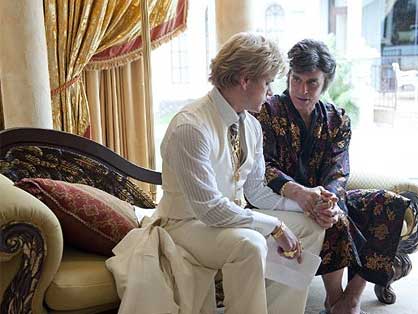
The relationship between the flamboyant pianist Liberace and his young lover has dazzled at the Cannes film festival and threw the spotlight on gay rights at the movie industry’s largest annual gathering.
Director Steven Soderbergh said he struggled five years ago to secure funding for Behind the Candelabra because some financiers thought the film would only appeal to a gay audience and, at a cost of US$25 million (NZ$30.6 million), would be a financial risk.
“Nobody would make it,” Soderbergh told The New York Post earlier this year. “We went to everybody in town. They all said it was too gay. And this is after ‘Brokeback Mountain,’ by the way, which is not as funny as this movie. I was stunned. It made no sense to any of us.”
Eventually he received financing from Time Warner’s HBO cable channel and made the film with Michael Douglas playing Liberace and Matt Damon as Scott Thorson with whom the pianist had a secret five-year affair.
Soderbergh said it was a coincidence that the film was being released during a global debate on gay rights and same sex marriage but acknowledged that it was very timely.
France last month became the 14th country to legalise gay marriage, a move also taken in the United States by Washington D.C. and 12 states. Liberace, a huge celebrity during his lifetime, publicly denied his homosexuality at a time when being gay was widely considered taboo.
“In making the film, the socio-political aspect of it was not really in my mind but I was focused on … trying to make this relationship as believable and realistic as we could,” Soderbergh told a news conference, flanked by Douglas and Damon.
“When this issue comes up, of equal rights for gays, I am hoping 50 years from now we will look back on this and wonder why this was even a debate and why it took so long.”
Douglas and Damon said they were both keen to work with Soderbergh who has announced his plan to retire from filmmaking after this movie.
They were both also impressed by the script based on Thorson’s autobiography, Behind the Candelabra: My Life with Liberace, that was released in 1988, a year after the entertainer’s death at age 67 from an Aids-related disease.
SPECTACULAR
In the film, Thorson, a naive 18-year-old farm boy from Wisconsin, meets 58-year-old Liberace in Las Vegas in 1977 and moves in with him, joining his glamorous lifestyle of champagne, jewel-encrusted cars and spectacular wardrobe.
An unrecognisable Debbie Reynolds plays Liberace’s beloved mother Frances, with her trademark button nose hidden under a prosthetic one, while a wrinkle-free, taut-faced Rob Lowe, is a plastic surgeon who operates on both Liberace and Thorson.
The relationship starts to unravel as Thorson becomes addicted to drugs, hawking jewellery given to him by his lover to fund his habit, and the sexually voracious Liberace’s interest moves on to other, younger men.
Ad Feedback
The two actors made light of their love scenes, with Douglas joking about asking Damon what flavour lip balm he preferred and Damon saying he could swap stories with Sharon Stone, Glenn Close and Demi Moore after sharing a bed with Douglas.
Douglas, whose performance as the primped, toupeed pianist was lauded by critics, said he met Liberace once, in a Rolls Royce convertible while in Palm Springs with his father, the movie star Kirk Douglas.
He became emotional, voice breaking and tears in his eyes, when asked how he became involved in the film that Soderbergh first raised with him 13 years ago.
“It was right after my cancer and this beautiful gift was handed to me and I am eternally grateful … to everybody for waiting for me,” said Douglas who was diagnosed with throat cancer in 2010 and needed chemotherapy and radiation treatment.
Behind the Candelabra will premiere on HBO in the United States on May 26 and open in foreign theatres from June 7.
The film is one of 20 movies in the main competition at Cannes vying for the Palme d’Or award for best picture that is presented on Sunday.
Soderbergh, 50, who won the Palme d’Or in 1989 with “Sex, Lies and Videotapes”, said this was his last movie for a while.
“I am absolutely taking a break. I don’t know how extended it is going to be but I can’t say if this were the last movie I make that I would be unhappy,” he said. “It’s been a nice run.”
– Reuters